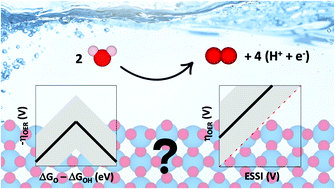Designing water splitting catalysts using rules of thumb: advantages, dangers and alternatives†
Abstract
Thermodynamic analysis of the oxygen evolution reaction (OER) hints toward an intrinsic overpotential caused by the nonoptimal adsorption-energy scaling relation between OH and OOH. Consequently, nowadays it is a widely accepted yet unverified rule of thumb that breaking such a scaling relation results in enhanced catalytic activity. In this perspective, we show that breaking the OH–OOH scaling relation does not per se lower the OER overpotential. Instead, electrocatalytic symmetry and ease of optimization are shown to be key factors when screening for enhanced OER catalysts. The essence of electrocatalytic symmetry is captured by a descriptor called the electrochemical-step symmetry index (ESSI). In turn, the ease of optimization and whether it should be scaling-based or scaling-free is provided by a procedure called δ–ε optimization. Finally, taking the search for bifunctional catalysts for oxygen electrocatalysis as an example, we show that the alternative analysis can be straightforwardly extended to other electrocatalytic reactions.

- This article is part of the themed collections: PCCP Emerging Investigators, PCCP Perspectives and 2020 PCCP HOT Articles


 Please wait while we load your content...
Please wait while we load your content...